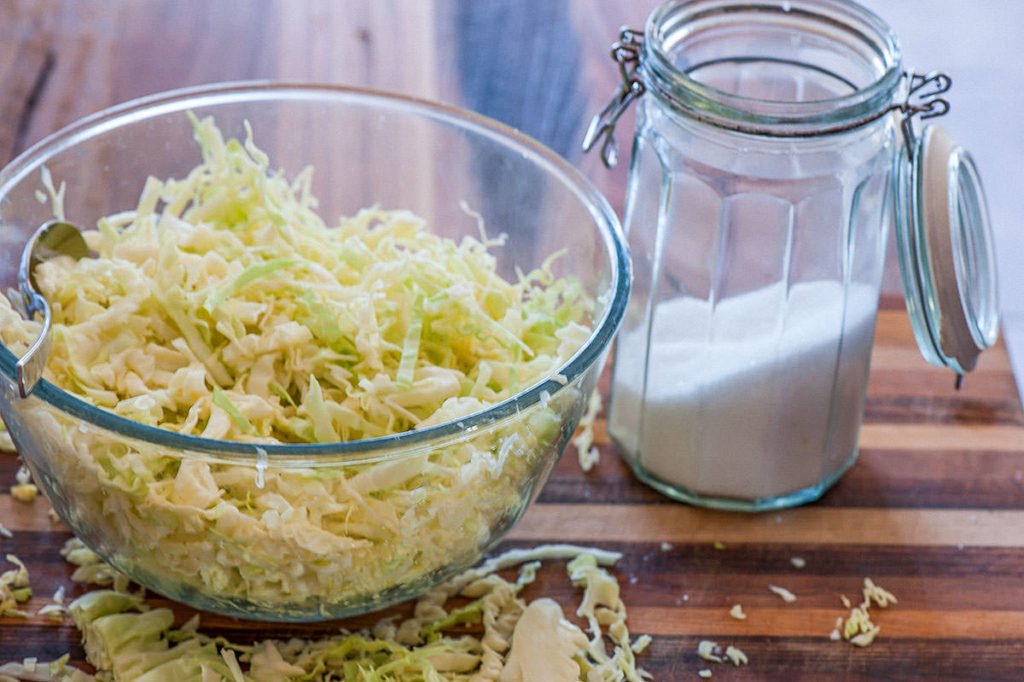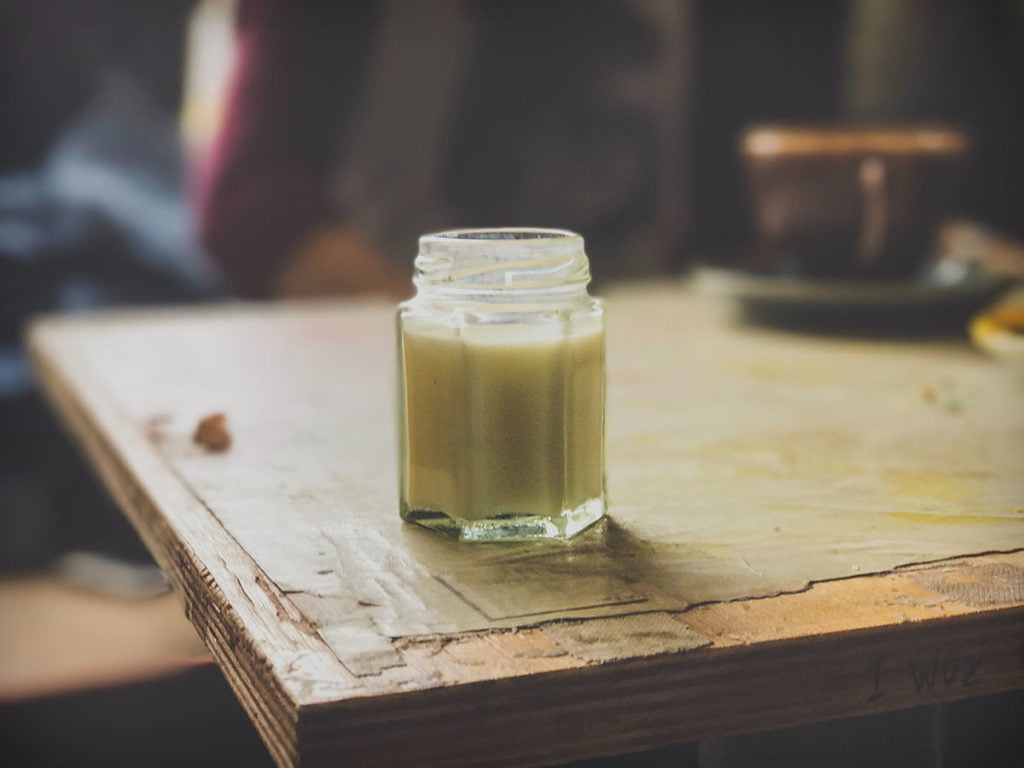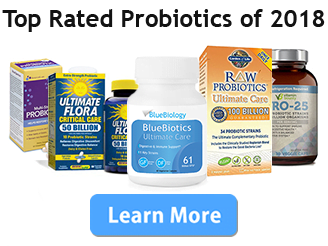What Are Probiotics? A Guide to Probiotic Foods, Supplements & Benefits

What are probiotics? The World Health Organization(WHO) defines probiotics as
The majority of probiotic microorganisms are bacteria. However, there is one yeast that has has probiotic benefits too: saccharomyces boulardii.
Probiotics have garnered a lot of spotlight and popularity in recent years, as news of their health benefits and distinct lack of negative side effects have come to light. It’s led to probiotics being widely available wherever vitamins and supplements are sold.
Some probiotics are found naturally within the human body, but just as many or even more are not. Regardless, all probiotics have positive health benefits for human hosts by positively influencing the state of the microbiome.
The result is improved overall health a better-functioning immune system that fights off pathogens that can cause us to get sick. Plus they give relief from the symptoms that come with certain illnesses.
Probiotics don’t just affect gut health either…
The gut microbiome consists of thousands of species of bacteria, viruses and fungi. Overall, there are trillions of microorganisms that make up this ecosystem.
Medical awareness of this ecosystem is actually nothing new; over a hundred years ago a zoologist who pioneered the study of cellular immunology by the name of Elie Metchnikoff theorized that the microbiome could be positively influenced with the probiotic bacteria found in yogurt.
Metchnikoff’s views were ahead of his time and he made some remarkable predictions:
Elie Metchnikoff’s theory may not have been thoroughly studied in his lifetime, but it did lay the foundation for discovering the benefits of probiotics through fecal transplantation and later on probiotic supplementation through easy-to-consume capsules and a more widespread understanding of the benefits of probiotic foods.
In recent years science and modern medicine have changed course and have come to realize the role of the microbiome in human health and its impacts on our overall health.
A large part of what probiotics do is they have a positive influence over the composition of the microbiome. They encourage the growth of the gut’s healthy microbes and discourage growth of the bad ones.
As it turns out, the microbiome isn’t just involved in our digestive system health.
This collection of microbes is actually so sophisticated that it and the brain send signals back and forth to each other. This relationship is called the “gut-brain axis”.
The existence of this communication channel between the two is part of the reason why the microbiome has such a large influence over our general health, and not just our gut health.
When it comes to answering “what are probiotics?”, we couldn’t do it without detailing all the potential health benefits that probiotics offer, which is what the next section will cover.

There have been numerous studies carried out regarding probiotics and diarrhea.
One of the systematic reviews and meta-analyses carried out on the subject was published in 2012 and found the available evidence shows that probiotics decrease AAD(antibiotic-associated diarrhea).[2]
The authors of this review, however, did express dissatisfaction with the reporting of the results; some of the studies reviewed published the genus and species of the tested probiotics but not the strain. This made it difficult to assess what strains specifically were leading to a reduction in diarrhea.
While this is a concern, we think it prudent to take probiotics with multiple strains that each have proven positive health benefits. This way, you receive the wide-ranging array of benefits that probiotics provide, treatment of diarrhea included—the good thing being is that there’s very little risk associated with any probiotics.
With this being said, we do agree that more clinical trials that have more thoroughly controlled variables need to be conducted so that the medical/scientific communities and consumers can make more informed decisions.
A more recent 2013 systematic review on probiotics and their effects on community-acquired diarrhea showed probiotics reduced the frequency of diarrhea by 13.1% and patients saw a reduction in duration by 14%.[3]
Probiotics confer health benefits onto their host during and after a course of antibiotics by restoring gastrointestinal microecology.
They do that in various ways: “through receptor competition, competition for nutrients, inhibition of epithelial and mucosal adherence of pathogens, introduction of lower colonic pH favoring the growth of nonpathogenic species, stimulation of immunity, or production of antimicrobial substances.”[4]

Researchers from the University of Toronto conducted a study on the emotional symptoms of patients with chronic fatigue syndrome and how they were affected by probiotics.
A very intriguing finding that they observed was that they “found a significant reduction in anxiety scores among those CFS patients consuming the LcS bacteria. The group differences in anxiety are noteworthy since anxiety is a frequent mental health symptom reported by CFS patients.”[5]
A study done in rats showed that a lactobacillus probiotic strain not only improved anxiety-like behavior, but also restored overall cognitive function.[6]
Multiple studies in recent years have uncovered and corroborated the fact that the microbiota(the collection of microorganisms that live within the gastrointestinal tract) communicates with the central nervous system by activating neural pathways.
Researchers from the Department of Psychiatry and Behavioural Neurosciences at McMaster University in Ontario, Canada, stated that “ongoing and future animal and clinical studies aimed at understanding the microbiota–gut–brain axis may provide novel approaches for prevention and treatment of mental illness, including anxiety and depression.[7]
Studies in animals have also shown that the microbiota is involved in the stress response to the environment and other stimuli.
When probiotics are introduced to the microbiota, they attenuate behaviors indicative of anxiety and depression in animal models.[8] It can’t just be assumed at face value that these findings will be directly transferrable to humans, but they are very promising results.
Traditional treatment for constipation has long been established, is safe and is effective in a good number of patients.[11] However, there are also a number of patients who don’t see adequate results, prompting them to seek other options.
In 2010, a systematic review of the available studies was conducted and showed that probiotics are effective in alleviating constipation.
The probiotic strains in these studies included bifidobacterium lactis, lactobacillus casei, escherichia coli Nissle 1917(this probiotic is different from the more commonly-known forms of e. coli that can be toxic), and L. casei rhamnosus Lcr35. These probiotics improved stool consistency and defecation frequency.[11]
There are many patients who experience adverse side effects from the pharmacological drugs that are normally prescribed for IBS, so patients have long sought alternatives.
Irritable bowel syndrome occurs when inflammatory indicators are overactive, when there are changes in the gut-brain axis caused by microbiome disruption and some other factors such as genetics. Probiotics provide their benefits because of their influence over balance of the gut microbiota, and in those with IBS that balance has been thrown off.
It’s through this positive influence over the microbiota that probiotics lessen the severity of irritable bowel syndrome.
In one of the most recent meta-analyses conducted in 2015, researchers found that probiotics “reduce pain and severity scores” in patients with IBS.[13]
While it appears there is much to be learned in regards to probiotics and Crohn’s disease (and it will undoubtedly be helpful once researchers find out what strains are the most effective in addressing Crohn’s) probiotics are very safe for the most part so there’s no harm in working it into a regular Crohn’s treatment regimen and assessing whether they’re helpful for you specifically.

The knowledge in regards to the relationship between probiotics and fatigue is still relatively in its infancy as well, but there is some evidence indicating that probiotics can provide some degree of alleviation from fatigue.
Many patients with chronic fatigue syndrome have a dysfunctional gastrointestinal motility (GI motility refers to the muscular contractions that move food along the intestines), which means that the digestive system doesn’t function optimally because of malfunctions such as intestinal paralysis and spasms.
What this has to do with probiotics is that they have been shown to improve gut motility, which in turn could have a positive impact on fatigue levels.[15]
However, antibiotics have been so over-prescribed to the point that some bacterial strains are becoming resistant to antibiotic treatment, which could cause widespread problems if the issue is not addressed.
The other issue with antibiotics is that they don’t discriminate between the types of bacteria that they kill. They wipe out all or the majority of the bacteria within the digestive system, without regard to whether the bacteria is good or bad.
This can leave the door open for pathogens that would normally be killed by good bacteria to flourish and cause infections or diseases, such as clostridium difficile.
Probiotics help restore a healthy balance to the microbiome (the collection of microorganisms that live within the human body), which tends to get wiped out after taking antibiotics. Having a well-balanced microbiome results in a stronger immune system and thus better overall health.
Probiotics are also effective in treating the symptoms of antibiotics, namely diarrhea, also known as antibiotic-associated diarrhea, or AAD. Antibiotic-associated diarrhea is a very common side effect estimated to occur in 30% of those who undergo antibiotic treatment.
A systematic review and meta-analysis on probiotics and antibiotic-associated diarrhea called for additional testing and analyses to be carried out but concluded that taking probiotics does result in a reduction in the occurrence of AAD.[16]

Over time, certain things can severely compromise our body’s delicate natural balance of probiotic flora. Things like antibiotics, sugar, lack of exercise, lack of sleep and smoking can all make for harmful environments for probiotics and the microbiome as a whole.
These things should be avoided as much as possible(and antibiotics should be used only when absolutely necessary) and conditions should be optimized for beneficial bacteria to grow.
A healthy diet provides an environment for beneficial bacteria to grow and discourages pathogenic microbes from living in the gut and causing infections.
A healthy diet to go along with probiotics consists of traditionally fermented foods, complex carbohydrates and fiber. Processed foods should be avoided. Sugar should be avoided as well, as bad bacteria thrive on it.
This section will cover some of the more well-known and studied strains and their health benefits.
One of the unique aspects of bacillus coagulans compared to other probiotics is its ability to survive in extremely harsh environments. The reason being is that it is able to change itself into a spore and go into a dormant state.
There are several ways in which bacillus coagulans provides health benefits.
Bifidobacterium breve is in some cases found naturally within the human body(the highest concentrations are found in the gastrointestinal tracts of infants and in human breast milk), and has wide-ranging health benefits.
The two benefits of bifidobacterium breve that probably have the ability to help the largest amount of people is helping with weight loss and improving the appearance and health of the skin.[30] [31]
Bifidobacterium breve can also:
Even with all these benefits that have been observed in clinical research, there’s still a lot to be learned about bifidobacterium breve. If you’d like to learn more about this probiotic strain, take a look at our page here: https://consumershealthreport.com/probiotic-supplements/bifidobacterium-breve/
It was originally discovered and isolated from human infant feces.
In a review on probiotics and their effects on irritable bowel syndrome, researchers found that some of the most compelling evidence came from trials that included bifidobacterium infantis. This probiotic demonstrated efficacy in reducing the effects associated with IBS.[38]
Bifidobacterium infantis also has an anti-tumor effect, which could be a significant finding in regards to the prevention of cancer, although additional research needs to be carried out.[39]
Additionally, some findings indicate that bifidobacterium infantis could be helpful in regulating depression, and by extension be applied to psychological well-being more broadly.[40]
Bifidobacterium longum is one of the probiotics that is often added to certain foods like yogurt for its health benefits. It’s also one of the first probiotic bacteria that colonize the gut in human life.
There is a large number of benefits that can come from having bifidobacterium longum in your diet. Bifidobacterium longum has been shown to:
There is also evidence indicating that bifidobacterium longum has various benefits on psychological well-being.
The existing research points to bifidobacterium longum being effective in fighting against depression[48], alleviating anxiety[49] , and even improving schizophrenia.[50]
The probiotics that fall under the bifidobacterium animalis species have a wide range of health benefits. They include losing weight/keeping weight off[51], it has immune system-boosting properties[52], alleviation of allergies and inflammation[53] [54], and it also has some antioxidant properties.[55]
Some studies have shown that bifidobacterium animalis could be effective in fighting against disease as well, including diabetes[56], celiac disease[57], autoimmune diseases[58], and could possibly even prevent and fight against cancer[59].
It fights against pathogenic infections like h. pylori too.[60]
These benefits are by no means comprehensive either; bifidobacterium animalis and its strains have numerous other health benefits that make it a very powerful health supplement.
It is the most thoroughly researched probiotic and is very commonly used in probiotic supplements due to its proven health benefits and safety record.
Some of the most notable reported health benefits of lactobacillus acidophilus include:
If you’d like to learn more about the history and potential health benefits of this probiotic, take a look at our page here.
There have been a number of studies reporting probiotic benefits of lactobacillus bulgaricus including:
Like many probiotics, lactobacillus casei has been shown to be beneficial in the prevention and regulation of diarrhea.[70] Patients suffering from constipation also saw an improvement in their condition.[71]
Some studies have shown that lactobacillus casei has the ability to stimulate the immune system.[72] [73]
Some other potential benefits of lactobacillus casei include:
Although it is a less-studied probiotic/antioxidant, there is some preliminary evidence of its probiotic effects.
Some of these potential health benefits include:
Some of the potential probiotic benefits of lactobacillus helveticus include:
Lactobacillus helveticus has a strong ability to survive transit through the gastrointestinal system, which allows it to pass off its benefits, which is not the strong suit of all probiotics(with some probiotics their bioavailability, or their ability to survive the journey through the gastrointestinal system, is questionable).[87]
It is also one of the most useful probiotics due to its wide variety of observed health benefits.
Back when this probiotic was discovered in the 1960s, it was naturally found in humans at a higher rate than is seen today due to dietary and lifestyle changes.[97]
The drop in prevalence of this probiotic is unfortunate but you personally can add this to your gut by making some changes to include it in your diet, or by taking it in supplement form or eating more fermented foods such as saurkraut and staying away from preservatives.
Lactobacillus rueteri is another probiotic that has a wide range of known potential health benefits.
Some of the more desired ones include:
This probiotic is likely beneficial in:
It’s also naturally found in the human body.
Lactobacillus paracasei’s health benefits include:
Lactobacillus helveticus has traditionally been used as a starter culture in Swiss cheeses.
There is evidence indicating that lactobacillus helveticus has the following health benefits:
It has a good safety record and a number of health benefits.
Those benefits include:
Some of them include:
It is naturally found in the human digestive tract and provides multiple health benefits such as:
This bacteria has long been used in the fermentation of various cheeses and other dairy products.
Here’s what makes lactococcus lactis a probiotic:
This probiotic has the potential to:
It’s used in the production of yogurt and other fermented milk products.
Less is known about this probiotic but it does have several possible health benefits:
It is derived from tropical plants.
Some of the potential health benefits of this yeast include:

Kombucha is a fermented tea made with tea leaves, sugar and probiotic yeasts/bacteria.
There have not been very many studies done directly on kombucha but it does contain probiotics that have been proven beneficial in supplement and other forms.
Some of the health benefits associated with the ingredients and probiotics found in kombucha include weight loss, detoxification, immune system benefits, liver benefits and digestion support.

Yogurt contains probiotic microorganisms from starter cultures that are used in the fermentation process or are added in later by the manufacturer.
There’s a variety of bacteria that can be used in the fermentation process and manufacturers can add whatever probiotics they deem appropriate, so there is a corresponding wide variety of probiotics(and therefore benefits) that you may get from yogurt.
There are also certain yogurts on the market that don’t contain any probiotics due to being killed in the pasteurization process. So when buying yogurt it’s important to do some background research into the brand and read the nutritional label if you want probiotic benefits.

Sauerkraut is a type of fermented cabbage which is used as both a side dish and condiment, depending on the location and culture where it is consumed.
Because of the fermentation process used to make sauerkraut, it has even more nutritional properties than the already-healthy cabbage itself.
The probiotics contained in sauerkraut have the ability to reduce cholesterol levels[161], and contains lactic acid bacteria, which is known to have a variety of health benefits.[162]

Like the other foods discussed here, the presence and strength of probiotics in pickles is highly dependent on the type of pickle and manufacturing process used.
There is evidence, however, that the strains found in pickles are “promising probiotic candidates”.[163]
A study done on Japanese traditional vegetable pickles showed that their bacteria could “could effectively stimulate immune activities and showed allergic inhibitory effects.”[164]

Kimchi is a traditional Korean food thought to have originated some 1500 years ago.[165]
It is manufactured by fermenting baechu cabbage with other subingredients such as garlic, ginger and red pepper powder.
The lactic acid bacteria produced in the fermentation process of kimchi has potential health benefits that include “anticancer, antiobesity, anticonstipation, colorectal health promotion, probiotic properties, cholesterol reduction, fibrolytic effect, antioxidative and antiaging properties, brain health promotion, immune promotion, and skin health promotion.”[166]

As with all probiotic foods you have to do your due diligence into the product and brand but there are certain cheeses that contain probiotics.
Studies have shown that bifidobacteria and lactobacillus probiotic strains are able to survive in cheeses such as cheddar and gouda.[167]

Kefir is a probiotic milk drink made by mixing bacterial and yeast cultures with cow’s milk.
The drink dates back 2,000 years and originated in the Caucasus Mountains of West Asia.
The drink has gained popularity in Western culture recently, undoubtedly in part due to its health benefits. Several studies have shown that kefir health benefits include “antimicrobial, antitumor, anticarcinogenic and immunomodulatory activity”. Not only that, but it also assists in lactose digestion.[168]
Based on the available studies on the subject, it appears that both probiotic foods and supplements are able to confer the health benefits associated with them.
Not everyone is a fan probiotic foods. What one person finds delicious another may find totally off-putting.
Many probiotic foods are fermented, and for many people this can be a bit of an acquired taste.
On top of that, a lot of the time with probiotic foods, you just don’t know exactly how potent the probiotics in a food are. If a food has a very low quantity of probiotic microorganisms, then it might not provide any probiotic benefit whatsoever.
Another thing worth taking into consideration with probiotic foods is how many probiotic species/strains they have. A lot of probiotic foods have just one probiotic strain, which is great but doesn’t necessarily provide the wide range of health benefits that many consumers want.
To get a full range of probiotic strains from food alone, you’d have to regularly consume a pretty wide variety of probiotic foods.
Perhaps the biggest concern with including probiotic foods in your diet is whether what you’re getting is really probiotic. When the companies who manufacture these foods pasteurize them by treating them with mild heat, it kills bad bacteria but also the good probiotic ones.
So what could have made for a probiotic food no longer is because of the pasteurization process. This has its pros and cons; it extends the shelf life and decreases the likelihood of spoilage but also kills off whatever probiotics there were.
If you’re serious about getting your probiotics from food, then a great way to ensure your foods are probiotic is by making them yourself.
While there is value in both probiotic foods and supplements, the good thing about taking a probiotic supplement is that it guarantees you get a healthy dose of probiotics consistently in your system and can give a wider variety of probiotic strains compared to just getting probiotics solely through food.
This type of encapsulation makes sure that the probiotic microorganisms are able to travel past the stomach and reach the gut.
We like supplementing with probiotics because you can get all the health benefits that probiotics provide through supplements in an easy and convenient to consume form.
You don’t have to go out of your way to take a capsule or two every morning or after dinner.
On top of that, probiotic supplements are often formulated with multiple strains, so it’s far easier to get a wider ranging number of health benefits than what you could realistically get on a daily basis compared to probiotic foods.
For those who are prone to upset stomach when taking pills on an empty stomach, taking probiotics with a meal is a good idea.
If you’re taking a round of antibiotics, probiotics should be taken at least two hours before or after the antibiotics. Antibiotics kill bacteria(which is what the majority of probiotic microorganisms are) so ingesting antibiotics and probiotics apart from each other ensures that they won’t interact with one another.
If you do a search for how many CFUs you should look for in a probiotic product, you’re likely to find a whole lot of contradictory information.
Recommendations range from less than one billion to 300 billion and up.
There’s nothing wrong with taking probiotics within this CFU range (and in fact we’ve found that somewhere in this range is likely best for most people), it’s just that there are wildly different recommendations within this range without a whole lot of evidence to back them up.
Part of the problem really is just that this hasn’t been a heavily researched area of probiotics even considering the large increase of studies into probiotics in recent years.
Based on what little evidence is out there on this specific topic, it suggests that a higher CFU of probiotics in the 50 billion to 100 billion range provides the most probiotic health benefits before seeing diminishing returns.[173] [174]
With that being considered as a baseline for what’s effective, you also have to take into account a couple factors, including:
The most commonly-reported side effects are a feeling of bloating and gas.[175] We’ve received a number of messages and comments on our site reporting such symptoms and to the point where some people opt out of taking probiotics as a result.
The scientific community has yet to arrive at a definitive conclusion as to why some individuals experience these side effects.
There’s certainly no reason to continue taking a probiotic if you’re experiencing extreme discomfort. However, it’s important to keep in mind that if you do experience some of these symptoms, they usually subside after a few weeks of continued use after your digestive system acclimates.[175]
One thing you can do to avoid digestive discomfort associated with probiotics is to start yourself off at a smaller dose and work your way up to a full one, which will help your body to adjust to them more gradually.
The purpose of histamines is to tell your body to get rid of any allergen that’s on or in your body through whatever means necessary. That may be through sneezing, coughing, itching or by having your eyes water.
Certain probiotic strains can cause symptoms similar to an allergic reaction in some people because of the body mistaking the added histamine levels as a legitimate threat.
Some of the known histamine-producing probiotic strains include streptococcus thermophilus, lactobacillus hilgardii, lactobacillus helveticus and lactobacillus buchneri.[176][177][178]
One strain in particular can lead to weight gain, at least. That strain is lactobacillus reuteri.[179]
Although the reasoning as to why is unclear, lactobacillus reuteri led to “significant weight gain” when introduced in rats, pigs and turkeys.[179] Being that this strain is considered a probiotic, it does have multiple health benefits but for many this is obviously a major downside, as most people are trying to lose weight, not gain it.
There are several probiotic strains that have been associated with weight loss, just not this one. There’s still a lot to be learned about how this strain affects humans, but you should probably avoid this strain if you’re trying to keep off or lose weight.
According to the CDC, “examples of persons with weakened immune systems include those with AIDS; cancer and transplant patients who are taking certain immunosuppressive drugs; and those with inherited diseases that affect the immune system (e.g., congenital agammaglobulinemia, congenital IgA deficiency).”[172]
If you’re immunocompromised you should avoid taking probiotics because there have been documented cases of overgrowth of probiotic bacteria. You’re probably aware if you’re immunocompromised, but if you’re unsure you should speak with your doctor if you’re considering taking probiotics.
The vast majority of people who take probiotics experience no side effects whatsoever. For those who do experience some side effects, they are relatively harmless and don’t last long.
The most common side effects associated with probiotics are the uncomfortable digestive issues such as feeling bloated and having gas.[171] For many of those who report having these symptoms they often say that they go away after taking probiotics for a couple weeks.
So if you’re taking probiotics for the first time and want to find out of they’ll really help you, it’s worth powering through any initial discomfort you experience to see if it’s just your body adjusting to the changes happening in your gut.
Any side effects will likely subside within a month but probiotics affect every one differently so pay attention to your body and make adjustments accordingly; you might find that you need to lower your dose or increase it.
The good thing is that the more serious side effects from probiotics are extremely rare. If you’re not immunocompromised, you can take them rest assured knowing that they’re safe.
There are a number of studies where researchers studied probiotic products containing multiple strains of probiotics, and therefore it’s difficult to assess the merits of each strain and what benefits can be attributed to them.
However, it has been proven in a slew of tests that probiotics do have some significant health benefits and for the most part are completely safe. More controlled testing is warranted but the testing so far has been extremely promising so we recommend getting a healthy amount into your regular diet and/or taking probiotic supplements.
Are you still asking “what are probiotics?” or are you unclear on anything in this article? Ask any questions you have in the comment section below.

Citations
Thanks to Julia Roe for sending me the link: https://consumershealthreport.com/probiotic-supplements/what-are-probiotics/
to this awesome site!
and: https://consumershealthreport.com

What are probiotics? The World Health Organization(WHO) defines probiotics as
Probiotics provide these health benefits in several ways:“live microorganisms which when administered in adequate amounts confer a health benefit on the host”.[1]
- Probiotics stimulate the immune system
- They produce vitamins and enzymes
- They reduce serum cholesterol
- They improve lactose absorption
- They inhibit pathogens
- They have antitumor properties [180]
The majority of probiotic microorganisms are bacteria. However, there is one yeast that has has probiotic benefits too: saccharomyces boulardii.
Probiotics have garnered a lot of spotlight and popularity in recent years, as news of their health benefits and distinct lack of negative side effects have come to light. It’s led to probiotics being widely available wherever vitamins and supplements are sold.
Some probiotics are found naturally within the human body, but just as many or even more are not. Regardless, all probiotics have positive health benefits for human hosts by positively influencing the state of the microbiome.
The result is improved overall health a better-functioning immune system that fights off pathogens that can cause us to get sick. Plus they give relief from the symptoms that come with certain illnesses.
Probiotics don’t just affect gut health either…
Probiotics, The Microbiome and The Gut-Brain Axis
In scientific terms, the vast collection of microorganisms (or microbes for short) that live in your gut is referred to as the “microbiome”.The gut microbiome consists of thousands of species of bacteria, viruses and fungi. Overall, there are trillions of microorganisms that make up this ecosystem.
Medical awareness of this ecosystem is actually nothing new; over a hundred years ago a zoologist who pioneered the study of cellular immunology by the name of Elie Metchnikoff theorized that the microbiome could be positively influenced with the probiotic bacteria found in yogurt.
Metchnikoff’s views were ahead of his time and he made some remarkable predictions:
His theory gained traction within the medical community for a time but it eventually fell into obscurity. It was revived in the mid-1990s as a theory worthy of mainstream scientific and medical study.“The promise of microbiome research results largely on the future of probiotics…. Eventually, it may become possible to restore the health of a depleted microbiome simply by swallowing a capsule crammed with billions of bacterial cells, or by eating yogurt”
Elie Metchnikoff’s theory may not have been thoroughly studied in his lifetime, but it did lay the foundation for discovering the benefits of probiotics through fecal transplantation and later on probiotic supplementation through easy-to-consume capsules and a more widespread understanding of the benefits of probiotic foods.
In recent years science and modern medicine have changed course and have come to realize the role of the microbiome in human health and its impacts on our overall health.
A large part of what probiotics do is they have a positive influence over the composition of the microbiome. They encourage the growth of the gut’s healthy microbes and discourage growth of the bad ones.
As it turns out, the microbiome isn’t just involved in our digestive system health.
This collection of microbes is actually so sophisticated that it and the brain send signals back and forth to each other. This relationship is called the “gut-brain axis”.
The existence of this communication channel between the two is part of the reason why the microbiome has such a large influence over our general health, and not just our gut health.
When it comes to answering “what are probiotics?”, we couldn’t do it without detailing all the potential health benefits that probiotics offer, which is what the next section will cover.
Probiotic Benefits: Conditions/Symptoms Probiotics Can Help With
Diarrhea

There have been numerous studies carried out regarding probiotics and diarrhea.
One of the systematic reviews and meta-analyses carried out on the subject was published in 2012 and found the available evidence shows that probiotics decrease AAD(antibiotic-associated diarrhea).[2]
The authors of this review, however, did express dissatisfaction with the reporting of the results; some of the studies reviewed published the genus and species of the tested probiotics but not the strain. This made it difficult to assess what strains specifically were leading to a reduction in diarrhea.
While this is a concern, we think it prudent to take probiotics with multiple strains that each have proven positive health benefits. This way, you receive the wide-ranging array of benefits that probiotics provide, treatment of diarrhea included—the good thing being is that there’s very little risk associated with any probiotics.
With this being said, we do agree that more clinical trials that have more thoroughly controlled variables need to be conducted so that the medical/scientific communities and consumers can make more informed decisions.
A more recent 2013 systematic review on probiotics and their effects on community-acquired diarrhea showed probiotics reduced the frequency of diarrhea by 13.1% and patients saw a reduction in duration by 14%.[3]
Probiotics confer health benefits onto their host during and after a course of antibiotics by restoring gastrointestinal microecology.
They do that in various ways: “through receptor competition, competition for nutrients, inhibition of epithelial and mucosal adherence of pathogens, introduction of lower colonic pH favoring the growth of nonpathogenic species, stimulation of immunity, or production of antimicrobial substances.”[4]
Anxiety

Researchers from the University of Toronto conducted a study on the emotional symptoms of patients with chronic fatigue syndrome and how they were affected by probiotics.
A very intriguing finding that they observed was that they “found a significant reduction in anxiety scores among those CFS patients consuming the LcS bacteria. The group differences in anxiety are noteworthy since anxiety is a frequent mental health symptom reported by CFS patients.”[5]
A study done in rats showed that a lactobacillus probiotic strain not only improved anxiety-like behavior, but also restored overall cognitive function.[6]
Multiple studies in recent years have uncovered and corroborated the fact that the microbiota(the collection of microorganisms that live within the gastrointestinal tract) communicates with the central nervous system by activating neural pathways.
Researchers from the Department of Psychiatry and Behavioural Neurosciences at McMaster University in Ontario, Canada, stated that “ongoing and future animal and clinical studies aimed at understanding the microbiota–gut–brain axis may provide novel approaches for prevention and treatment of mental illness, including anxiety and depression.[7]
Studies in animals have also shown that the microbiota is involved in the stress response to the environment and other stimuli.
When probiotics are introduced to the microbiota, they attenuate behaviors indicative of anxiety and depression in animal models.[8] It can’t just be assumed at face value that these findings will be directly transferrable to humans, but they are very promising results.
Constipation
Constipation is a condition that diminishes quality of life and afflicts a relatively large number of people of all ages; estimates range from 12% to 27.2% of the population. It’s more common among women and chances of having it go up after age 65.[9] [10]Traditional treatment for constipation has long been established, is safe and is effective in a good number of patients.[11] However, there are also a number of patients who don’t see adequate results, prompting them to seek other options.
In 2010, a systematic review of the available studies was conducted and showed that probiotics are effective in alleviating constipation.
The probiotic strains in these studies included bifidobacterium lactis, lactobacillus casei, escherichia coli Nissle 1917(this probiotic is different from the more commonly-known forms of e. coli that can be toxic), and L. casei rhamnosus Lcr35. These probiotics improved stool consistency and defecation frequency.[11]
IBS
Irritable bowel syndrome is a relatively common condition that affects the large intestine. It is characterized by excess gas, diarrhea, constipation, cramping, abdominal pain, bloating and mucus in the stool. It’s a chronic condition in many patients who have it, so it needs to be managed over time.[12]There are many patients who experience adverse side effects from the pharmacological drugs that are normally prescribed for IBS, so patients have long sought alternatives.
Irritable bowel syndrome occurs when inflammatory indicators are overactive, when there are changes in the gut-brain axis caused by microbiome disruption and some other factors such as genetics. Probiotics provide their benefits because of their influence over balance of the gut microbiota, and in those with IBS that balance has been thrown off.
It’s through this positive influence over the microbiota that probiotics lessen the severity of irritable bowel syndrome.
In one of the most recent meta-analyses conducted in 2015, researchers found that probiotics “reduce pain and severity scores” in patients with IBS.[13]
Crohn’s Disease
Research into the potential treatment of Crohn’s disease with probiotics is still in its infancy, but there have been some tests that showed “significant improvements” in Crohn’s disease activity indices and histological scores.[14]While it appears there is much to be learned in regards to probiotics and Crohn’s disease (and it will undoubtedly be helpful once researchers find out what strains are the most effective in addressing Crohn’s) probiotics are very safe for the most part so there’s no harm in working it into a regular Crohn’s treatment regimen and assessing whether they’re helpful for you specifically.
Fatigue

The knowledge in regards to the relationship between probiotics and fatigue is still relatively in its infancy as well, but there is some evidence indicating that probiotics can provide some degree of alleviation from fatigue.
Many patients with chronic fatigue syndrome have a dysfunctional gastrointestinal motility (GI motility refers to the muscular contractions that move food along the intestines), which means that the digestive system doesn’t function optimally because of malfunctions such as intestinal paralysis and spasms.
What this has to do with probiotics is that they have been shown to improve gut motility, which in turn could have a positive impact on fatigue levels.[15]
Recovering From Antibiotics
It’s widely known that antibiotics have had an enormous impact on the world and have saved countless lives. There are many bacterial diseases that are easily treatable today with antibiotics that resulted in severe illness or even death before their discovery.However, antibiotics have been so over-prescribed to the point that some bacterial strains are becoming resistant to antibiotic treatment, which could cause widespread problems if the issue is not addressed.
The other issue with antibiotics is that they don’t discriminate between the types of bacteria that they kill. They wipe out all or the majority of the bacteria within the digestive system, without regard to whether the bacteria is good or bad.
This can leave the door open for pathogens that would normally be killed by good bacteria to flourish and cause infections or diseases, such as clostridium difficile.
Probiotics help restore a healthy balance to the microbiome (the collection of microorganisms that live within the human body), which tends to get wiped out after taking antibiotics. Having a well-balanced microbiome results in a stronger immune system and thus better overall health.
Probiotics are also effective in treating the symptoms of antibiotics, namely diarrhea, also known as antibiotic-associated diarrhea, or AAD. Antibiotic-associated diarrhea is a very common side effect estimated to occur in 30% of those who undergo antibiotic treatment.
A systematic review and meta-analysis on probiotics and antibiotic-associated diarrhea called for additional testing and analyses to be carried out but concluded that taking probiotics does result in a reduction in the occurrence of AAD.[16]
Promoting a Healthy Environment for Probiotics

Over time, certain things can severely compromise our body’s delicate natural balance of probiotic flora. Things like antibiotics, sugar, lack of exercise, lack of sleep and smoking can all make for harmful environments for probiotics and the microbiome as a whole.
These things should be avoided as much as possible(and antibiotics should be used only when absolutely necessary) and conditions should be optimized for beneficial bacteria to grow.
A healthy diet provides an environment for beneficial bacteria to grow and discourages pathogenic microbes from living in the gut and causing infections.
A healthy diet to go along with probiotics consists of traditionally fermented foods, complex carbohydrates and fiber. Processed foods should be avoided. Sugar should be avoided as well, as bad bacteria thrive on it.
What are Probiotic Strains?
Probiotics are not all the same; they range widely in the the amount and types of benefits they confer. Some of them are bacterial strains and others are yeasts.This section will cover some of the more well-known and studied strains and their health benefits.
Bacillus Coagulans
Bacillus coagulans is a probiotic whose health effects and benefits are still being uncovered. Like with many probiotics though, the outlook is promising and very little side effects have been observed.One of the unique aspects of bacillus coagulans compared to other probiotics is its ability to survive in extremely harsh environments. The reason being is that it is able to change itself into a spore and go into a dormant state.
There are several ways in which bacillus coagulans provides health benefits.
- There have been several studies show that bacillus coagulans alleviates and improves quality of life for those with abdominal pain.[17] [18]
- There is also evidence indicating that it helps with constipation[19], improves muscle recovery[20], and boosts the immune system.[21]
- There is additional evidence suggesting that bacillus coagulans has beneficial effects for those with conditions such as IBS(irritable bowel syndrome), rheumatoid arthritis, and diabetes. [22] [23] [24]
Bifidobacterium Lactis
Bifidobacterium lactis is a subspecies of bifidobacterium animalis and has some notable probiotic qualities.- Some research has shown that bifidobacterium lactis can assist in the digestion of gluten in those with coeliac disease or those with less severe gluten intolerances. This promotes the health of the small intestine and thus overall health in general.[25]
- Bifidobacterium lactis also improves the immune system by strengthening the immune response at the cellular level.[26]
- Bifidobacterium lactis, like multiple other probiotic strains, has a protective effect against diarrhea.
Bifidobacterium Bifidum
Research thus far into bifidobacterium bifidum has been limited, there have been a handful of studies showing its health benefits.- For one, bifidobacterium bifidum could be a great way to treat or use as a supplemental treatment for those who have irritable bowel syndrome. A randomised clinical trial showed that bifidobacterium bifidum “significantly alleviates irritable bowel syndrome and improves quality of life” and researchers called it a “promising candidate for IBS therapy.”.[27]
- It also appears that bifidobacterium bifidum could have some seriously positive implications in the prevention of eczema in at-risk infants. Eczema is characterized by dry, scaly, sensitive skin that for many is extremely uncomfortable and itchy.[28] A study found that by administering a probiotic mix including bifidobacterium bifidum, eczema can be prevented altogether.[29]
Bifidobacterium Breve
Bifidobacterium breve is one of the most common strains found in probiotic supplements, and for good reason.Bifidobacterium breve is in some cases found naturally within the human body(the highest concentrations are found in the gastrointestinal tracts of infants and in human breast milk), and has wide-ranging health benefits.
The two benefits of bifidobacterium breve that probably have the ability to help the largest amount of people is helping with weight loss and improving the appearance and health of the skin.[30] [31]
Bifidobacterium breve can also:
- Alleviate allergies[32]
- Alleviate constipation[33]
- Combat against asthma[34]
- Reduces inflammation[35]
- Improve gastrointestinal health[36]
- Prevent/fight against infections[37]
Even with all these benefits that have been observed in clinical research, there’s still a lot to be learned about bifidobacterium breve. If you’d like to learn more about this probiotic strain, take a look at our page here: https://consumershealthreport.com/probiotic-supplements/bifidobacterium-breve/
Bifidobacterium Infantis
Bifidobacterium infantis is a gram-positive anaerobic bacterium that is naturally found within the human body in the gastrointestinal tract and in the oral cavity.It was originally discovered and isolated from human infant feces.
In a review on probiotics and their effects on irritable bowel syndrome, researchers found that some of the most compelling evidence came from trials that included bifidobacterium infantis. This probiotic demonstrated efficacy in reducing the effects associated with IBS.[38]
Bifidobacterium infantis also has an anti-tumor effect, which could be a significant finding in regards to the prevention of cancer, although additional research needs to be carried out.[39]
Additionally, some findings indicate that bifidobacterium infantis could be helpful in regulating depression, and by extension be applied to psychological well-being more broadly.[40]
Bifidobacterium Longum
Bifidobacterium longum is a gram-positive probiotic bacteria that produces lactic acid within the gastrointestinal tract. This production of lactic acid is beneficial to the immune system, as it inhibits the growth of harmful, pathogenic bacteria that cause infections.Bifidobacterium longum is one of the probiotics that is often added to certain foods like yogurt for its health benefits. It’s also one of the first probiotic bacteria that colonize the gut in human life.
There is a large number of benefits that can come from having bifidobacterium longum in your diet. Bifidobacterium longum has been shown to:
- Provide relief from allergies[41] [42]
- Provide relief from inflammation[43]
- It lowers cholesterol[44]
- Improves health of the skin[45]
- It’s beneficial for bone and liver health[46] [47]
There is also evidence indicating that bifidobacterium longum has various benefits on psychological well-being.
The existing research points to bifidobacterium longum being effective in fighting against depression[48], alleviating anxiety[49] , and even improving schizophrenia.[50]
Bifidobacterium Animalis
Bifidobacterium animalis is a species of bacteria rather than a strain; two of its more common and commercially available strains include B. animalis spp. lactis BB-12 and B. animalis spp. lactis DN-173 010.The probiotics that fall under the bifidobacterium animalis species have a wide range of health benefits. They include losing weight/keeping weight off[51], it has immune system-boosting properties[52], alleviation of allergies and inflammation[53] [54], and it also has some antioxidant properties.[55]
Some studies have shown that bifidobacterium animalis could be effective in fighting against disease as well, including diabetes[56], celiac disease[57], autoimmune diseases[58], and could possibly even prevent and fight against cancer[59].
It fights against pathogenic infections like h. pylori too.[60]
These benefits are by no means comprehensive either; bifidobacterium animalis and its strains have numerous other health benefits that make it a very powerful health supplement.
Lactobacillus Acidophilus
Lactobacillus acidophilus is a lactic acid-producing gram-positive bacteria.It is the most thoroughly researched probiotic and is very commonly used in probiotic supplements due to its proven health benefits and safety record.
Some of the most notable reported health benefits of lactobacillus acidophilus include:
- Prevention/reduction of diarrhea[61]
- Could have the potential to lower cholesterol[62]
- Activates the immune system[63]
- Could help those who are lactose intolerant[64]
- Could aid in the prevention of allergies[65]
- Fights against infections and disease such as irritable bowel syndrome and cancer.
If you’d like to learn more about the history and potential health benefits of this probiotic, take a look at our page here.
Lactobacillus Bulgaricus
Lactobacillus bulgaricus is a probiotic that is adept at surviving in harsh environments, whether that be highly acidic environments or those with high temperatures.There have been a number of studies reporting probiotic benefits of lactobacillus bulgaricus including:
- Prevention and treatment of diarrhea[66]
- Potential to improve psychological well-being[67], and the
- Prevention and alleviation of the symptoms of conditions like c. difficile[68] and inflammatory bowel disease[69] (although more research needs to be carried out).
Lactobacillus Casei
Lactobacillus casei is a probiotic bacteria whose health benefits derive from it having helpful antioxidant effects.Like many probiotics, lactobacillus casei has been shown to be beneficial in the prevention and regulation of diarrhea.[70] Patients suffering from constipation also saw an improvement in their condition.[71]
Some studies have shown that lactobacillus casei has the ability to stimulate the immune system.[72] [73]
Some other potential benefits of lactobacillus casei include:
- Alleviation of arthritis symptoms[74]
- could be helpful in the treatment/maintenance treatment of allergies[75]
- could assist in the treatment of diabetes[76] and multiple animal studies indicate that improves liver function.
- Lactobacillus casei has also been linked to improving cognitive capabilities.[77]
Lactobacillus fermentum
Species of the lactobacillus fermentum genus can be found naturally within the human intestinal tract.[78] [79]Although it is a less-studied probiotic/antioxidant, there is some preliminary evidence of its probiotic effects.
Some of these potential health benefits include:
- Lowering cholesterol[80]
- exhibits anti-inflammatory properties[81]
- has benefits on cognitive function/mood[82] (among several others)
Lactobacillus helveticus
Lactobacillus helveticus is a lactic acid probiotic bacteria that can be be found naturally in the human gut, as well as in certain foods.Some of the potential probiotic benefits of lactobacillus helveticus include:
- Being a sleep aid[83]
- it appears to have some benefits on psychological issues like anxiety and depression[84], and could be effective in lowering blood pressure.
- There are also multiple studies indicating that lactobacillus helveticus is beneficial to the health of the GI tract in general and is antagonistic towards pathogens that cause infections.[85] [86]
Lactobacillus helveticus has a strong ability to survive transit through the gastrointestinal system, which allows it to pass off its benefits, which is not the strong suit of all probiotics(with some probiotics their bioavailability, or their ability to survive the journey through the gastrointestinal system, is questionable).[87]
Lactobacillus Plantarum
Lactobacillus plantarum is one of the more well-studied of the known probiotic strains.It is also one of the most useful probiotics due to its wide variety of observed health benefits.
- Lactobacillus plantarum is thought to improve absorption of both calcium[88] and iron[89].
- Lactobacillus plantarum also produces vitamin B, which, as many know has a number of health benefits itself, such as improving the health of blood cells and nerves.[90]
- Lactobacillus plantarum is likely beneficial in fighting weight gain[91]
- Is good for heart health[92] and liver health[93]
- Appears to be beneficial in managing diabetes[94]
- Has benefits for dental heatlh[95]
- Has benefits for skin heatlh[96]
Lactobacillus Rueteri
Lactobacillus rueteri is a lactic acid-producing bacteria that can be found in the digestive tracts of humans, mammals and birds, although in humans it tends to be found in relatively small numbers.Back when this probiotic was discovered in the 1960s, it was naturally found in humans at a higher rate than is seen today due to dietary and lifestyle changes.[97]
The drop in prevalence of this probiotic is unfortunate but you personally can add this to your gut by making some changes to include it in your diet, or by taking it in supplement form or eating more fermented foods such as saurkraut and staying away from preservatives.
Lactobacillus rueteri is another probiotic that has a wide range of known potential health benefits.
Some of the more desired ones include:
- The fact that it’s an anti-inflammatory[98]
- Improved appearance of hair and skin in this study[99]
- Lowers cholesterol[100]
- Speeds up the wound-healing process[101] among others.
Lactobacillus Gasseri
Lactobacillus gasseri is a probiotic of the lactobacillus genus, which convert sugars to lactic acid.This probiotic is likely beneficial in:
- Alleviating fatigue[102]
- Helping with asthma[103]
- Treating allergies[104]
- Reducing inflammation[105]
- Suppressing infections[106] [107]
Lactobacillus Paracasei
Lactobacillus paracasei is a gram-positive lactic acid probiotic that is frequently added to probiotic-infused foods such as yogurt.It’s also naturally found in the human body.
Lactobacillus paracasei’s health benefits include:
- Lowered obesity levels in animal test subjects[108]
- Improves the health of the skin[109]
- Could improve liver function[110]
- Could potentially be an effective strategy in inhibiting cancer growth[111] among others.
Lactobacillus Helveticus
This probiotic can be found in certain dairy products and there is evidence showing that it supports the digestive system and stimulates the immune system.Lactobacillus helveticus has traditionally been used as a starter culture in Swiss cheeses.
There is evidence indicating that lactobacillus helveticus has the following health benefits:
- Prevents infections and other illnesses[112]
- Is good for processing and maintaining healthy levels of calcium[113] [114]
- Lowers blood pressure[115]
- Could have psychological benefits for depression and anxiety[116]
- It improved perception of sleep in elderly patients compared to a placebo[117]
Lactobacillus Rhamnosus
Lactobacillus rhamnosus is up there with the most studied and widely-used strains of probiotics.It has a good safety record and a number of health benefits.
Those benefits include:
- Prevention of allergic reactions
- Prevention and treatment of diarrhea and other gastrointestinal issues
- It also stimulates immune response[118]
Lactobacillus Plantarum
Lactobacillus plantarum is a lactic acid bacteria probiotic with a plethora of health benefits.Some of them include:
- It shows promise in preventing cancer[119]
- Is good for heart health[120] [121] [122]
- Could help with weight loss[123]
- Is good for hydration and overall health of the skin[124]
- Is good for the immune system and fights against infections and viruses such as candida[125], the flu[126], and h. pylori.[127]
- Could be effective in improving psychological well-being, as it has improved depression, anxiety and stress levels in some tests[128] [129], as well as improving memory and learning[130].
Lactobacillus Salivarius
Lactobacillus salivarius is a lactic acid bacteria that gets its name from it having been first isolated from human saliva.It is naturally found in the human digestive tract and provides multiple health benefits such as:
- Has multiple dental benefits[131] [132] [133]
- Showed beneficial immunomodulatory activity in asthma patients[134]
- Lowers bad cholesterol[135]
- Fights several forms of inflammation[136] [137]
Lactococcus Lactis
Lactococcus lactis is a probiotic which has a generally recognized as safe(GRAS) status from the food and drug administration(FDA).This bacteria has long been used in the fermentation of various cheeses and other dairy products.
Here’s what makes lactococcus lactis a probiotic:
- It’s an antioxidant[138]
- It has lowered blood pressure in animal testing[139]
- Appears to fight cancer[140] [141]
- Helps maintain bone density[142]
- Could delay hearing loss[143]
- Improves the immune system[144] [145] [146] [147]
- Improves the appearance and health of the skin[148] [149]
Pediococcus Acidilactici
Pediococcus acidilactici is a more obscure bacteria, but has the generally recognized as safe(GRAS) status and has been proven to have some probiotic properties.This probiotic has the potential to:
- Have a positive influence over cell growth
- Improves cholesterol removal capability
- Improves bacteriocin production[150]
Streptococcus Thermophilus
Streptococcus thermophilus is a gram-positive lactic acid bacteria.It’s used in the production of yogurt and other fermented milk products.
Less is known about this probiotic but it does have several possible health benefits:
- Has shown anti-tumor activity in animal testing, so it could help to combat cancer[151]
- Kills bacteria that causes bad breath[152]
- Could lessen the severity of lactose intolerance[153]
Saccharomyces Boulardii
Saccharomyces boulardii is unlike many other probiotics in that it’s a yeast rather than a bacteria.It is derived from tropical plants.
Some of the potential health benefits of this yeast include:
- Promotes liver and intestinal health and protects them from damage[154]
- Enhances the immune response[155]
- Fights pathogens that cause infections[156] [157]
- Is beneficial in conditions such as IBS[158], colitis[159] and Crohn’s disease[160].
Foods Containing Probiotics
There are plenty of foods that contain probiotics, whether they contain them naturally, are used in the fermentation process or were added to the food simply because of their health benefits.Kombucha

Kombucha is a fermented tea made with tea leaves, sugar and probiotic yeasts/bacteria.
There have not been very many studies done directly on kombucha but it does contain probiotics that have been proven beneficial in supplement and other forms.
Some of the health benefits associated with the ingredients and probiotics found in kombucha include weight loss, detoxification, immune system benefits, liver benefits and digestion support.
Yogurt

Yogurt contains probiotic microorganisms from starter cultures that are used in the fermentation process or are added in later by the manufacturer.
There’s a variety of bacteria that can be used in the fermentation process and manufacturers can add whatever probiotics they deem appropriate, so there is a corresponding wide variety of probiotics(and therefore benefits) that you may get from yogurt.
There are also certain yogurts on the market that don’t contain any probiotics due to being killed in the pasteurization process. So when buying yogurt it’s important to do some background research into the brand and read the nutritional label if you want probiotic benefits.
Sauerkraut

Sauerkraut is a type of fermented cabbage which is used as both a side dish and condiment, depending on the location and culture where it is consumed.
Because of the fermentation process used to make sauerkraut, it has even more nutritional properties than the already-healthy cabbage itself.
The probiotics contained in sauerkraut have the ability to reduce cholesterol levels[161], and contains lactic acid bacteria, which is known to have a variety of health benefits.[162]
Pickles

Like the other foods discussed here, the presence and strength of probiotics in pickles is highly dependent on the type of pickle and manufacturing process used.
There is evidence, however, that the strains found in pickles are “promising probiotic candidates”.[163]
A study done on Japanese traditional vegetable pickles showed that their bacteria could “could effectively stimulate immune activities and showed allergic inhibitory effects.”[164]
Kimchi

Kimchi is a traditional Korean food thought to have originated some 1500 years ago.[165]
It is manufactured by fermenting baechu cabbage with other subingredients such as garlic, ginger and red pepper powder.
The lactic acid bacteria produced in the fermentation process of kimchi has potential health benefits that include “anticancer, antiobesity, anticonstipation, colorectal health promotion, probiotic properties, cholesterol reduction, fibrolytic effect, antioxidative and antiaging properties, brain health promotion, immune promotion, and skin health promotion.”[166]
Cheese

As with all probiotic foods you have to do your due diligence into the product and brand but there are certain cheeses that contain probiotics.
Studies have shown that bifidobacteria and lactobacillus probiotic strains are able to survive in cheeses such as cheddar and gouda.[167]
Kefir

Kefir is a probiotic milk drink made by mixing bacterial and yeast cultures with cow’s milk.
The drink dates back 2,000 years and originated in the Caucasus Mountains of West Asia.
The drink has gained popularity in Western culture recently, undoubtedly in part due to its health benefits. Several studies have shown that kefir health benefits include “antimicrobial, antitumor, anticarcinogenic and immunomodulatory activity”. Not only that, but it also assists in lactose digestion.[168]
Probiotic Foods or Supplements?
This is just a small number of foods containing probiotics—there are many more that can improve your health by adding to your diet.Based on the available studies on the subject, it appears that both probiotic foods and supplements are able to confer the health benefits associated with them.
Probiotic Foods and Their Potential Problems
A 2014 study[169] suggests that probiotic foods are slightly more favorable in terms of their viability in delivering their benefits. However, for a variety of reasons, not everyone has the option of working that many probiotic foods into their diet.Not everyone is a fan probiotic foods. What one person finds delicious another may find totally off-putting.
Many probiotic foods are fermented, and for many people this can be a bit of an acquired taste.
On top of that, a lot of the time with probiotic foods, you just don’t know exactly how potent the probiotics in a food are. If a food has a very low quantity of probiotic microorganisms, then it might not provide any probiotic benefit whatsoever.
Another thing worth taking into consideration with probiotic foods is how many probiotic species/strains they have. A lot of probiotic foods have just one probiotic strain, which is great but doesn’t necessarily provide the wide range of health benefits that many consumers want.
To get a full range of probiotic strains from food alone, you’d have to regularly consume a pretty wide variety of probiotic foods.
Perhaps the biggest concern with including probiotic foods in your diet is whether what you’re getting is really probiotic. When the companies who manufacture these foods pasteurize them by treating them with mild heat, it kills bad bacteria but also the good probiotic ones.
So what could have made for a probiotic food no longer is because of the pasteurization process. This has its pros and cons; it extends the shelf life and decreases the likelihood of spoilage but also kills off whatever probiotics there were.
If you’re serious about getting your probiotics from food, then a great way to ensure your foods are probiotic is by making them yourself.
While there is value in both probiotic foods and supplements, the good thing about taking a probiotic supplement is that it guarantees you get a healthy dose of probiotics consistently in your system and can give a wider variety of probiotic strains compared to just getting probiotics solely through food.
Probiotic Supplements
As long as you choose a supplement with a viable delivery system, probiotic supplements are a great way to get the health benefits of probiotics. That means choosing a probiotic supplement product that’s delivered in enteric-coated capsules.This type of encapsulation makes sure that the probiotic microorganisms are able to travel past the stomach and reach the gut.
We like supplementing with probiotics because you can get all the health benefits that probiotics provide through supplements in an easy and convenient to consume form.
You don’t have to go out of your way to take a capsule or two every morning or after dinner.
On top of that, probiotic supplements are often formulated with multiple strains, so it’s far easier to get a wider ranging number of health benefits than what you could realistically get on a daily basis compared to probiotic foods.
Best Time to Eat/Take Probiotics
As far as when to take probiotic supplements go, there isn’t a whole lot of definitive research on the topic. However, the available research thus far seems to indicate that taking probiotics within 30 minutes of a meal or at mealtime leads to the best outcomes.[170]For those who are prone to upset stomach when taking pills on an empty stomach, taking probiotics with a meal is a good idea.
If you’re taking a round of antibiotics, probiotics should be taken at least two hours before or after the antibiotics. Antibiotics kill bacteria(which is what the majority of probiotic microorganisms are) so ingesting antibiotics and probiotics apart from each other ensures that they won’t interact with one another.
How Many Probiotics Do You Need?
With so many probiotic products out on the market with a range of different potencies, you may be wondering what the ideal daily CFU, or Colony Forming Units, you should take. A CFU count is measured in the billions and refers to how many microorganisms there are within the product that are able to divide and form colonies.If you do a search for how many CFUs you should look for in a probiotic product, you’re likely to find a whole lot of contradictory information.
Recommendations range from less than one billion to 300 billion and up.
There’s nothing wrong with taking probiotics within this CFU range (and in fact we’ve found that somewhere in this range is likely best for most people), it’s just that there are wildly different recommendations within this range without a whole lot of evidence to back them up.
Part of the problem really is just that this hasn’t been a heavily researched area of probiotics even considering the large increase of studies into probiotics in recent years.
Based on what little evidence is out there on this specific topic, it suggests that a higher CFU of probiotics in the 50 billion to 100 billion range provides the most probiotic health benefits before seeing diminishing returns.[173] [174]
With that being considered as a baseline for what’s effective, you also have to take into account a couple factors, including:
- Everyone’s biology is different: that means an amount that works for someone else may not be right for you. Your body could require significantly more or less probiotics than the next person. At least at this stage of our understanding of probiotics, one of the best things you can do for yourself is just trial and error. Try taking probiotics of different CFU count potency and find out what works best for you and your specific biology/health condition.
- Not all the probiotic organisms will survive the journey: if we’re being realistic, not all the probiotics in a supplement will survive the journey from manufacturing facility to your gut. The reality is that many of these organisms will die in transit due to being exposed to extreme heat in transportation trucks. By buying probiotics with higher CFU counts, there’s a higher chance that a portion of those probiotic microorganisms will actually reach your gut.
Potential Side Effects of Probiotics
There are very few side effects of taking probiotic supplements, and the majority of the ones reported thus far are mostly mild. However, there have been instances of more serious complications so it’s important to be aware of them and when to potentially avoid taking probiotics.Digestive Discomfort: Bloating/Gas/Stomachache
It’s not uncommon for first-time probiotics users to experience some uncomfortable digestive symptoms.The most commonly-reported side effects are a feeling of bloating and gas.[175] We’ve received a number of messages and comments on our site reporting such symptoms and to the point where some people opt out of taking probiotics as a result.
The scientific community has yet to arrive at a definitive conclusion as to why some individuals experience these side effects.
There’s certainly no reason to continue taking a probiotic if you’re experiencing extreme discomfort. However, it’s important to keep in mind that if you do experience some of these symptoms, they usually subside after a few weeks of continued use after your digestive system acclimates.[175]
One thing you can do to avoid digestive discomfort associated with probiotics is to start yourself off at a smaller dose and work your way up to a full one, which will help your body to adjust to them more gradually.
Increase in Histamine Levels
Histamines are chemicals that your immune system produces in response to allergens, or triggers that cause allergic reactions.The purpose of histamines is to tell your body to get rid of any allergen that’s on or in your body through whatever means necessary. That may be through sneezing, coughing, itching or by having your eyes water.
Certain probiotic strains can cause symptoms similar to an allergic reaction in some people because of the body mistaking the added histamine levels as a legitimate threat.
Some of the known histamine-producing probiotic strains include streptococcus thermophilus, lactobacillus hilgardii, lactobacillus helveticus and lactobacillus buchneri.[176][177][178]
Weight Gain
Yep, you read that right—considering the claims you may have heard about probiotics helping with weight loss, you may be surprised that probiotics could actually be associated with weight gain.One strain in particular can lead to weight gain, at least. That strain is lactobacillus reuteri.[179]
Although the reasoning as to why is unclear, lactobacillus reuteri led to “significant weight gain” when introduced in rats, pigs and turkeys.[179] Being that this strain is considered a probiotic, it does have multiple health benefits but for many this is obviously a major downside, as most people are trying to lose weight, not gain it.
There are several probiotic strains that have been associated with weight loss, just not this one. There’s still a lot to be learned about how this strain affects humans, but you should probably avoid this strain if you’re trying to keep off or lose weight.
Should Anyone Avoid Probiotics? A Potential Risk for Immunocompromised Patients
As you probably know by now, probiotics are good microorganisms that have a mutually beneficial with their host. However, too much of a good thing can be bad in the case of probiotics for certain people.According to the CDC, “examples of persons with weakened immune systems include those with AIDS; cancer and transplant patients who are taking certain immunosuppressive drugs; and those with inherited diseases that affect the immune system (e.g., congenital agammaglobulinemia, congenital IgA deficiency).”[172]
If you’re immunocompromised you should avoid taking probiotics because there have been documented cases of overgrowth of probiotic bacteria. You’re probably aware if you’re immunocompromised, but if you’re unsure you should speak with your doctor if you’re considering taking probiotics.
The vast majority of people who take probiotics experience no side effects whatsoever. For those who do experience some side effects, they are relatively harmless and don’t last long.
The most common side effects associated with probiotics are the uncomfortable digestive issues such as feeling bloated and having gas.[171] For many of those who report having these symptoms they often say that they go away after taking probiotics for a couple weeks.
So if you’re taking probiotics for the first time and want to find out of they’ll really help you, it’s worth powering through any initial discomfort you experience to see if it’s just your body adjusting to the changes happening in your gut.
Any side effects will likely subside within a month but probiotics affect every one differently so pay attention to your body and make adjustments accordingly; you might find that you need to lower your dose or increase it.
The good thing is that the more serious side effects from probiotics are extremely rare. If you’re not immunocompromised, you can take them rest assured knowing that they’re safe.
Conclusion
There needs to be a significant more amount of research done on probiotics, and more specifically, which probiotic strains do what.There are a number of studies where researchers studied probiotic products containing multiple strains of probiotics, and therefore it’s difficult to assess the merits of each strain and what benefits can be attributed to them.
However, it has been proven in a slew of tests that probiotics do have some significant health benefits and for the most part are completely safe. More controlled testing is warranted but the testing so far has been extremely promising so we recommend getting a healthy amount into your regular diet and/or taking probiotic supplements.
Are you still asking “what are probiotics?” or are you unclear on anything in this article? Ask any questions you have in the comment section below.
Wondering which probiotics you should buy?
Not all probiotic supplements are created equally. Take a look at our top 5 probiotics here:
Citations
Thanks to Julia Roe for sending me the link: https://consumershealthreport.com/probiotic-supplements/what-are-probiotics/
to this awesome site!
and: https://consumershealthreport.com






 Sat Mar 23, 2024 11:33 pm by globalturbo
Sat Mar 23, 2024 11:33 pm by globalturbo

